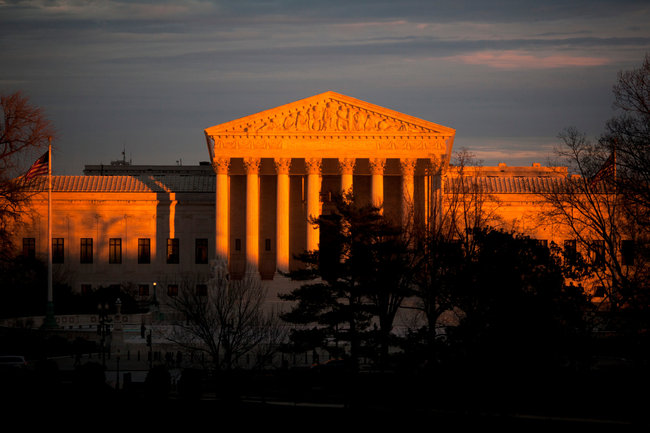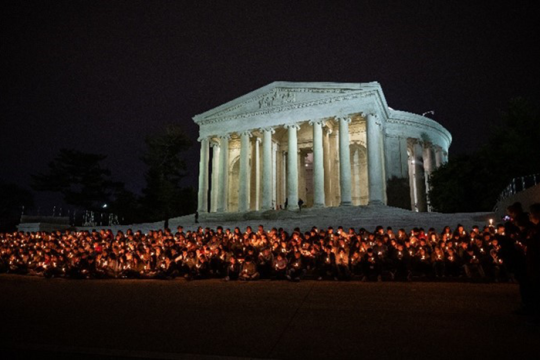
On Wednesday, Assistant Legislative Director Sarah Greenberg and I arrived at the Supreme Court well before sunrise and waited hours in line to attend oral arguments for Zubik v. Burwell, the case about the Affordable Care Act (ACA) contraception accommodation for religious non-profit organizations in person.
The accommodation was challenged under the Religious Freedom Restoration Act (RFRA), with petitioners claiming that the current rule imposes a substantial burden on their religious beliefs. The government, in defending the accommodation, argues that the accommodation does not constitute a substantial burden, and even if it did, that the compelling government interest in public health and gender equality is furthered in the least restrictive means. Currently, under the accommodation, religious non-profits that object to providing contraception have to notify the government. Then, a third party administrator works with the employees to ensure seamless coverage for contraception.
It was an experience of a lifetime to be in the Supreme Court chamber watching this oral argument. Here is a summary of what happened:
One of the main themes of oral argument was where the government should draw the line between protecting religious liberty and governmental interests, and what accommodations or burdens are acceptable to ensure government interests. In a line of questioning to Paul Clement, the lawyer representing the petitioners, Justice Breyer noted, “Sometimes when a religious person who’s not a hermit or a monk is a member of society, he does have to accept all kinds of things that are just terrible for him… What is the line?” Justice Sotomayor also noted that even though the sincere religious beliefs of organizations may be burdened, that “we are not asking you to do anything except identify yourself…that’s the balance that we have struck…that it’s not a substantial burden is someone else is going to do the act that you’re objecting to.”
Another main theme of oral argument was whether there is an alternative to the accommodation that would ensure women receive seamless contraception coverage without barriers and satisfy the objections of religious non-profits. However, Solicitor General Donald Verrilli pointed out that requiring women who wanted contraceptive coverage to have two separate insurance providers, and could possibly not go through their regular healthcare provider to receive contraception would amount to a burden that would discourage women from seeking this care. It is not simply a matter, as Justice Roberts asked, of who fills out the paperwork.
The full transcript of oral arguments can be found here. Below is a list of helpful articles to learn more about the Zubik v. Burwell oral argument:
- SCOTUSblog’s Argument Analysis: On New Health Care Case, a Single Word May Tell it All
- Slate: The Birth Control Hijack
- MSNBC: Who Will Bear the Burden on Birth Control
- Politico: Divided Supreme Court hears Obamacare Birth Control Challenge
A decision from the Supreme Court is expected in June, and it has the potential to have major implications on both reproductive rights and religious freedom for years to come. Not only could the Court’s decision impact countless women who are employees of religious non-profit organizations, but it also has the potential to change how Religious Freedom Restoration Act is interpreted, which could impact many areas of law beyond healthcare.
With only eight justices, some Supreme Court decisions this term may come down as a 4-4 tie. Since there are several cases that were consolidated into Zubik, each of the lower circuit courts’ decisions will stand in that jurisdiction.
The Reform Movement has a strong and long-standing history of supporting religious freedom and reproductive rights. We played a key role in passing the RFRA in the 1990s, and believe that the accommodation in question wisely and delicately balances the petitioners’ religious liberty with a woman’s right to make her own healthcare decisions.
Recently, the RAC and Women of Reform Judaism hosted a webinar on Zubik v. Burwell and Whole Woman’s Health v. Hellerstedt, another case this term about reproductive rights. To view the recording of the webinar, visit the Tent’s Social Action Group. For more information about these topics, visit our webpages on reproductive rights and judicial issues.
Update: On March 29, the Supreme Court asked both parties in the case to file additional briefs outlining new ways to spare religious non-profit institutions from any role in providing contraception to their employees while still assuring that those services are available. Both parties have until April 12 to submit these briefs, and will then have an opportunity to reply to the briefs by April 20. We still expect a decision from the Court by the end of the term in June.
Related Posts

Teens from North Carolina Speak About Environmental Justice

Why is this Right Different?: City of Grants Pass, Oregon v. Johnson and the Passover Call to Action


